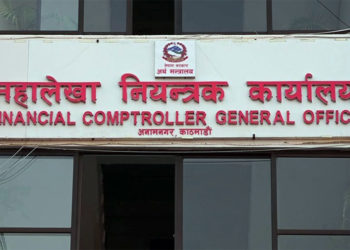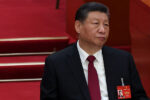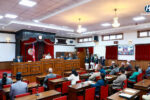KATHMANDU: Economic Digest offers a concise yet comprehensive overview of significant business happenings in Nepal, presented in easily digestible summaries.
The text highlights various economic and infrastructural developments in Nepal, emphasizing both challenges and opportunities. The reduction in customs duties on gold imports has led to a significant surge, contributing to increased government revenue.
Similarly, smartphone imports have also risen, reflecting a growing demand, which is benefiting government revenue. However, economic issues persist, with real estate entrepreneurs seeking alternative funding options and Bagmati Province grappling with underutilized budgets and declining revenues.
Challenges in the energy sector, like the strain on the Kulekhani hydropower reservoir due to limited imports from India, raise concerns about sustainability.
Additionally, Nepal is focusing on infrastructural projects such as road upgrades and border security, while also addressing socio-economic concerns, including labor laws and tourism development.
However, inefficiencies in tourism projects and concerns over political decisions, such as the status of VIP benefits, reflect ongoing struggles in balancing growth and governance.
Gold imports surge after tariff reduction
After the government reduced the customs duty on gold from 20% to 10% in December 2023, gold imports into Nepal have surged.
From July 2023 to mid-March 2024, over 1,223 kg of gold worth NPR 14.77 billion was imported. The highest monthly import was 402 kg in January 2024.
The government collected NPR 1.61 billion in revenue from these imports. Commercial banks are permitted to import up to 20 kg of gold daily, with gold sourced from countries such as the UAE, Turkey, China, India, and more than 20 other nations.
Nepal’s smartphone imports exceed Rs 21 billion in eight months
In the first eight months of FY 2081/82, Nepal’s smartphone imports surpassed Rs 21.91 billion, according to the Department of Customs. This marks an increase from last year’s imports, which totaled Rs 19.37 billion for 1.25 million units.
This year, 1.4 million smartphones were imported. As smartphone imports rise, so does government revenue, with a collection of Rs 4.08 billion this year, compared to Rs 3.60 billion last year.
Additionally, 1.6 million other telephone sets worth Rs 1.52 billion were imported, generating Rs 283.8 million in revenue.
Real estate entrepreneurs to establish investment company
In response to Nepal’s ongoing economic challenges, real estate entrepreneurs are creating an investment company using their own funds, with contributions from developers nationwide.
The company, designed to reduce reliance on bank loans, was announced at the Rupandehi Real Estate Association’s convention. The initiative aims to revive the post-pandemic real estate market.
Industry leaders argue that excessive government regulations have exacerbated the crisis and are calling for real estate to be recognized as an official industry.
Investment of Rs 3.68 billion in Koshi’s Orthodox Tea Industry
Koshi Province is home to 84 orthodox tea industries, with a total investment of Rs 3.68 billion.
Of this, 36.4% is funded by loans, and 63.6% comes from equity. Only two of these industries have foreign investment. The region has 100 processing units, including 21 organic-certified and 79 non-certified.
In the fiscal year 2079/80, these industries produced 7.83 million kg of processed tea, with 88.6% of it being exported, primarily to India and other countries. The industry’s revenue reached Rs 2.57 billion, 86.72% of which came from exports.
However, the industry faces challenges with low capacity utilization (56.21%), mainly due to shortages of raw materials, irregular electricity supply, and a lack of skilled workers.
Bagmati Province faces low expenditure and revenue decline
Bagmati Province has spent only 25.62% of its Rs 64.05 billion budget in the first eight months of FY 2081/82. Current expenditures account for 35.22%, while capital expenditure stands at just 19.94%.
Revenue collection is behind, with only 38.13% of the target achieved. The province’s revenue has been steadily declining, with last year’s shortfall amounting to Rs 9.31 billion.
The decline is attributed to reduced federal allocations, the economic slowdown, and lower tax revenues. The Ministry of Tourism, Industry, and Cooperatives recorded the lowest spending at 9.79%, while the Office of the Provincial Chief Attorney had the highest at 47.69%.
Kulekhani Hydropower Reservoir faces strain
The Kulekhani hydropower reservoir in Nepal is under pressure as imports of electricity from India are limited to just 12 hours per day. To meet demand, all three Kulekhani projects are operating continuously, causing the water level to drop by an average of 36 cm per day.
Since the start of the dry season, the reservoir level has decreased by 6.18 meters. If it reaches 1,483 meters, power generation will cease, raising concerns about the sustainability of the energy supply.
New Finance Bill aims to shift deposits from banks to alternative development fund
The government is introducing an Alternative Development Finance Company, which will compete with banks for deposits by offering tax exemptions.
The proposed bill, drafted by the Ministry of Finance, will allow married couples to make tax-free deposits of up to NPR 200,000, provided they are held for at least three years.
Institutional investors who invest 20% of their taxable income in the fund will receive a 50% tax exemption on interest income. The Nepal Bankers’ Association has expressed concern that this could divert deposits from banks, negatively affecting the financial sector.
National Water Conference highlights need for sustainable water resource management
At the first National Water Conference 2081 BS, Minister for Energy, Water Resources, and Irrigation, Dipak Khadka, emphasized the importance of water resources in national prosperity and daily life.
The two-day conference, organized by the Water and Energy Commission Secretariat, focused on glacier preservation, integrated water management, governance, transnational cooperation, and climate change. Khadka called for collective efforts to protect and efficiently use Nepal’s water resources.
Kaligandaki Corridor road upgrade nearing completion
The 9 km stretch of the Beni-Jomsom-Korala road, a key part of the national pride Kaligandaki Corridor linking India and China, has been blacktopped. The project was delayed by five years due to difficult terrain, the COVID-19 pandemic, floods, and contractor issues.
Now 95% complete, the road is expected to boost trade, tourism, and regional development by significantly reducing travel time and improving connectivity in Gandaki Province.
“No lifetime benefits for former VIPs”
Health and Population Minister Pradip Paudel has stated that former VIPs should not be entitled to lifelong state benefits, although they deserve respect.
Speaking at a Nepali Congress event in Banke, he stressed that medical colleges must adhere to regulations and warned of revoking affiliations from institutions that fail to pay staff.
He also highlighted efforts to adjust medicine prices, boost domestic production, and expand health insurance coverage to 6.6 million households.
Nepal to adjust minimum wage starting next fiscal year
The Department of Labor and Occupational Safety is preparing to increase the minimum wage for workers, effective from Shrawan 1, 2082.
The current minimum wage is Rs 17,300 per month, including a basic salary of Rs 10,820 and a cost-of-living allowance of Rs 6,480. Despite previous increases, some businesses have not implemented them.
The Department plans stricter monitoring and enforcement to ensure compliance. It also aims to promote fair labor practices, strengthen internal employment, and combat child and forced labor.
Indo-Nepal Trade Fair features Nepali handicrafts and herbal wood products
At the Indo-Nepal Trade Fair in Dehradun, Ganesh Bohora from Kanchanpur showcased Vijaysal wooden utensils, which are known for their health benefits.
He highlighted the Ayurvedic properties of handcrafted cups and glasses made from the wood. Despite challenges in sourcing Vijaysal wood, he continues production and reforestation efforts.
The fair also featured Nepali handicrafts, honey, spices, Dhaka garments, and Thangka paintings, providing Nepali exhibitors with opportunities to expand their markets. However, they called for easier cross-border logistics to facilitate trade.
Binod Chaudhary calls on parties to address youth aspirations
Industrialist and Nepali Congress leader Binod Chaudhary has urged political parties and the government to address the aspirations of Nepal’s youth.
Speaking at a regional conference in Parasi, Nawalparasi, he noted that 8 million Nepali youths are abroad, and their expectations are shaped by social media.
Chaudhary also called for the speedy completion of the Hulaki Highway and Narayangadh-Butwal road project, criticizing delays. He expressed frustration over the failure to reopen the Bhujhawa customs checkpoint despite discussions with four finance ministers.
Police investigating the source of Rs. 251 million foreign currency seized
Kushang Lama, also known as Fuchhe, was arrested with €1,375,150 and $320,850 hidden in a secret compartment of his truck. The origins and ownership of the money remain unclear.
Lama, a former gold smuggler, has provided vague statements, prompting an intense investigation by police and the Department of Revenue Investigation. Authorities suspect a connection to gold smuggling through the Nepal-China border. Investigators are examining call records and tracking the serial numbers of the seized currency to uncover its true source.
Nepal to set up border outpost at China border in Manang
Nepal is set to establish a Border Outpost (BOP) at Phu village, located in Narpabhumi Rural Municipality-4, near the Nepal-China border in Manang. Positioned at 4,000 meters above sea level, the BOP aims to enhance border security, prevent cross-border crime, and assist in disaster management.
The outpost will house 35 armed police officers. The remote area, which lacks a road network, can only be accessed via a two-day trek from Chame.
Dhankuta’s costly tourism infrastructure remains underutilized
Dhankuta Municipality has invested millions in tourism infrastructure, including caves, waterfalls, view towers, and parks, but tourist numbers remain disappointingly low.
Despite spending Rs 10 million on Okmalung Cave and its surroundings, locals report no visitors. Similar issues affect Hile Siran’s view tower and Chuliban Park.
Experts blame poor planning, inadequate publicity, and political instability for the underutilization of these tourism projects.
Assistant Professor Bhesraj Khatri argues that excessive spending on artificial structures instead of promoting natural attractions has led to the failure of Dhankuta’s tourism initiatives.
Defense Minister promises to open Gokarna forest road
Defense Minister Manbir Rai has pledged to help open the road inside Gokarna Forest, which is currently blocked by walls and barbed wire under Nepal Trust.
Gokarneshwar Municipality has long advocated for access to the road, which would ease traffic congestion and connect key areas such as Gokarneshwar Temple, Dakshindhoka, and Mulpani. Lawmakers and local representatives have urged Prime Minister KP Sharma Oli to take action, and he has also expressed commitment to resolving the issue. The blocked road has hindered the opening of the Bagmati Corridor in the region.









Comment